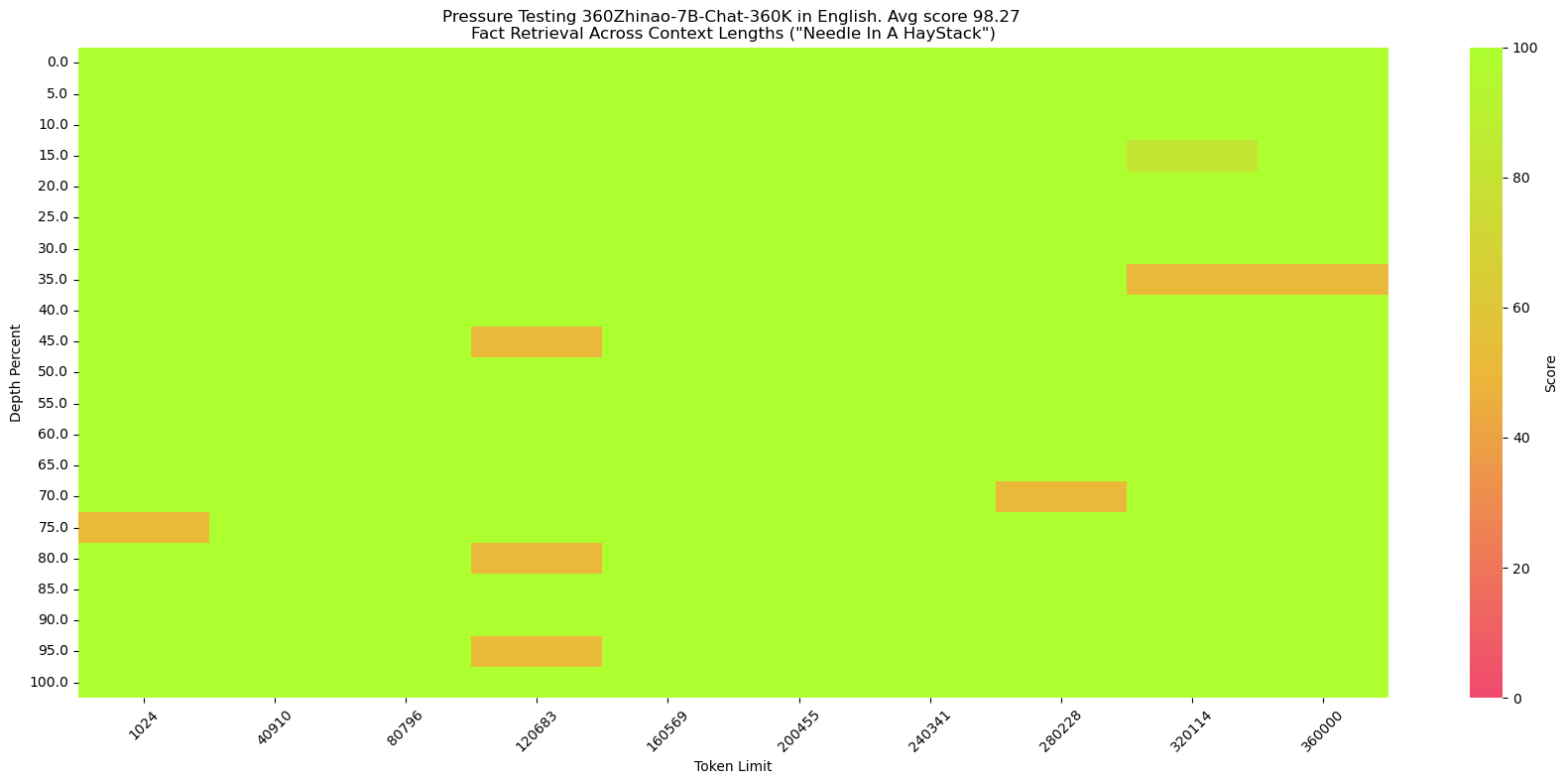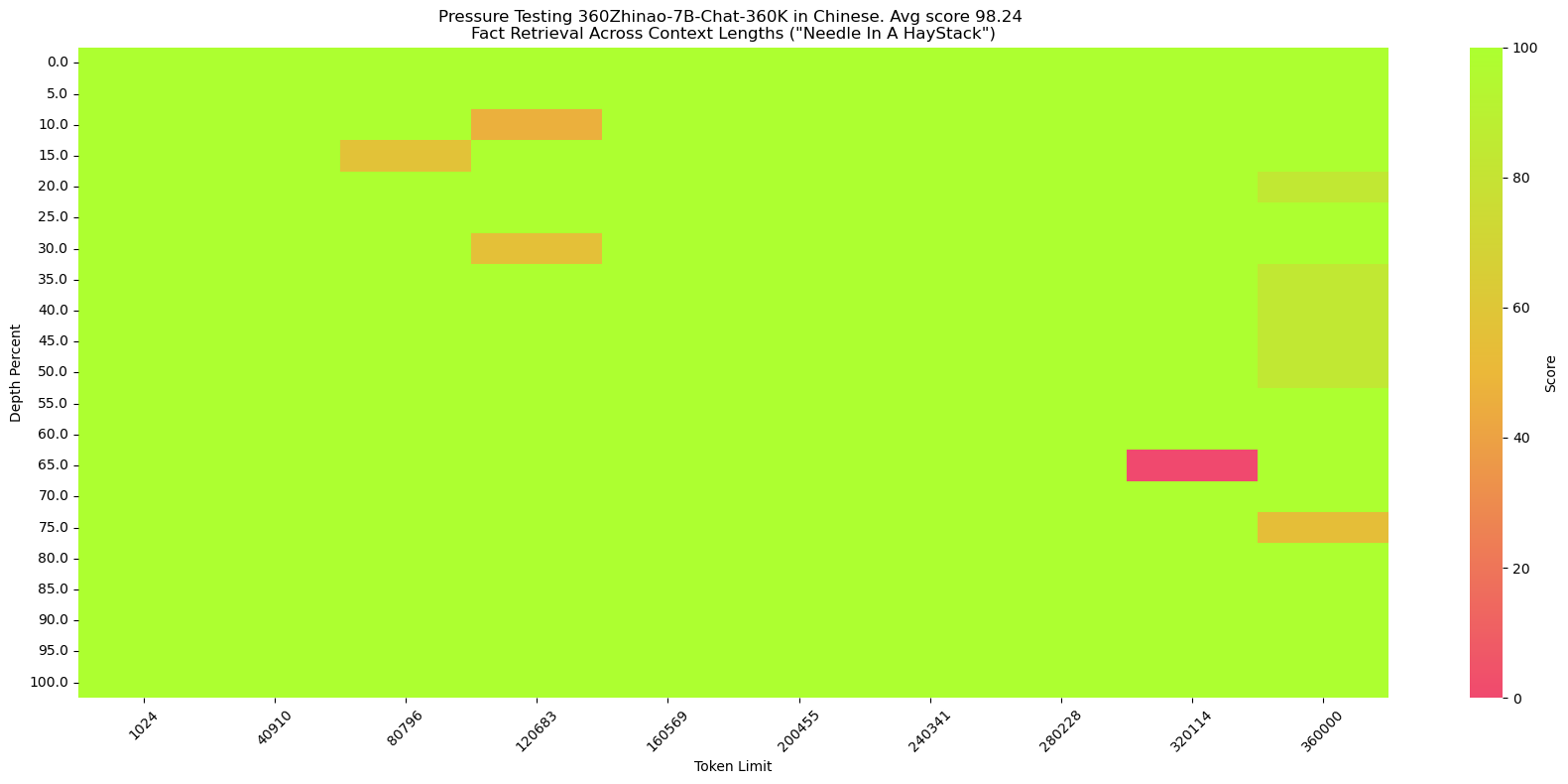
Feel free to visit 360Zhinao's official website https://ai.360.com for more experience.

**needle**:The best thing to do in San Francisco is eat a sandwich and sit in Dolores Park on a sunny day. **query**:What is the best thing to do in San Francisco? - Chinese version

We constructed the Chinese version following the [SuperCLUE-200K benchmark](https://mp.weixin.qq.com/s/QgoRf2LB-7vc3vTFOHJkpw):
**haystack**:Chinese novels.
**needle**:(in Chinese) 王莽是一名勤奋的店员,他每天凌晨就起床,赶在第一缕阳光照亮大地之前到达店铺,为即将开始的一天做准备。他清扫店铺,整理货架,为顾客提供方便。他对五金的种类和用途了如指掌,无论顾客需要什么,他总能准确地找到。\n然而,他的老板刘秀却总是对他吹毛求疵。刘秀是个挑剔的人,他总能在王莽的工作中找出一些小错误,然后以此为由扣他的工资。他对王莽的工作要求非常严格,甚至有些过分。即使王莽做得再好,刘秀也总能找出一些小问题,让王莽感到非常沮丧。\n王莽虽然对此感到不满,但他并没有放弃。他知道,只有通过自己的努力,才能获得更好的生活。他坚持每天早起,尽管他知道那天可能会再次被刘秀扣工资。他始终保持微笑,尽管他知道刘秀可能会再次对他挑剔。
**query**:(in Chinese) 王莽在谁的手下工作?
# Quickstart
Simple examples to illustrate how to use 360Zhinao-7B-Base and 360Zhinao-7B-Chat quickly using 🤖 ModelScope and 🤗 Transformers
## Dependency Installation
- python 3.8 and above
- pytorch 2.0 and above
- transformers 4.37.2 and above
- CUDA 11.4 and above are recommended.
```shell
pip install -r requirements.txt
```
We recommend installing Flash-Attention (which currently supports flash attention 2) to increase your performance and reduce your memory footprint. (flash-attention is optional and will work without installation)
>flash-attn >= 2.3.6
```shell
FLASH_ATTENTION_FORCE_BUILD=TRUE pip install flash-attn==2.3.6
```
## 🤗 Transformers
### Demonstration of Base Model Inference
This code demonstrates fast inference with 360Zhinao-7B-Base models using transformers.
```python
from transformers import AutoTokenizer, AutoModelForCausalLM
from transformers.generation import GenerationConfig
MODEL_NAME_OR_PATH = "qihoo360/360Zhinao-7B-Base"
tokenizer = AutoTokenizer.from_pretrained(
MODEL_NAME_OR_PATH,
trust_remote_code=True)
model = AutoModelForCausalLM.from_pretrained(
MODEL_NAME_OR_PATH,
device_map="auto",
trust_remote_code=True)
generation_config = GenerationConfig.from_pretrained(
MODEL_NAME_OR_PATH,
trust_remote_code=True)
inputs = tokenizer('中国二十四节气\n1. 立春\n2. 雨水\n3. 惊蛰\n4. 春分\n5. 清明\n', return_tensors='pt')
inputs = inputs.to(model.device)
pred = model.generate(input_ids=inputs["input_ids"], generation_config=generation_config)
print("outputs:\n", tokenizer.decode(pred.cpu()[0], skip_special_tokens=True))
```
### Demonstration of Chat Model Inference
This code demo uses transformers to quickly use the 360Zhinao-7B-Chat-4K model for inference.
```python
from transformers import AutoTokenizer, AutoModelForCausalLM
from transformers.generation import GenerationConfig
MODEL_NAME_OR_PATH = "qihoo360/360Zhinao-7B-Chat-4K"
tokenizer = AutoTokenizer.from_pretrained(
MODEL_NAME_OR_PATH,
trust_remote_code=True)
model = AutoModelForCausalLM.from_pretrained(
MODEL_NAME_OR_PATH,
device_map="auto",
trust_remote_code=True)
generation_config = GenerationConfig.from_pretrained(
MODEL_NAME_OR_PATH,
trust_remote_code=True)
messages = []
#round-1
messages.append({"role": "user", "content": "介绍一下刘德华"})
response = model.chat(tokenizer=tokenizer, messages=messages, generation_config=generation_config)
messages.append({"role": "assistant", "content": response})
print(messages)
#round-2
messages.append({"role": "user", "content": "他有什么代表作?"})
response = model.chat(tokenizer=tokenizer, messages=messages, generation_config=generation_config)
messages.append({"role": "assistant", "content": response})
print(messages)
```
## 🤖 ModelScope
### Demonstration of Base Model Inference
This code demonstrates using ModelScope to quickly use the 360Zhinao-7B-Base model for inference.
```python
from modelscope import AutoModelForCausalLM, AutoTokenizer
from modelscope import GenerationConfig
MODEL_NAME_OR_PATH = "qihoo360/360Zhinao-7B-Base"
tokenizer = AutoTokenizer.from_pretrained(
MODEL_NAME_OR_PATH,
trust_remote_code=True)
model = AutoModelForCausalLM.from_pretrained(
MODEL_NAME_OR_PATH,
device_map="auto",
trust_remote_code=True)
generation_config = GenerationConfig.from_pretrained(
MODEL_NAME_OR_PATH,
trust_remote_code=True)
inputs = tokenizer('中国二十四节气\n1. 立春\n2. 雨水\n3. 惊蛰\n4. 春分\n5. 清明\n', return_tensors='pt')
inputs = inputs.to(model.device)
pred = model.generate(input_ids=inputs["input_ids"], generation_config=generation_config)
print("outputs:\n", tokenizer.decode(pred.cpu()[0], skip_special_tokens=True))
```
### Demonstration of Chat Model Inference
This code demonstrates using ModelScope to quickly use the 360Zhinao-7B-Chat-4K model for inference.
```python
from modelscope import AutoModelForCausalLM, AutoTokenizer
from modelscope import GenerationConfig
MODEL_NAME_OR_PATH = "qihoo360/360Zhinao-7B-Chat-4K"
tokenizer = AutoTokenizer.from_pretrained(
MODEL_NAME_OR_PATH,
trust_remote_code=True)
model = AutoModelForCausalLM.from_pretrained(
MODEL_NAME_OR_PATH,
device_map="auto",
trust_remote_code=True)
generation_config = GenerationConfig.from_pretrained(
MODEL_NAME_OR_PATH,
trust_remote_code=True)
messages = []
#round-1
messages.append({"role": "user", "content": "介绍一下刘德华"})
response = model.chat(tokenizer=tokenizer, messages=messages, generation_config=generation_config)
messages.append({"role": "assistant", "content": response})
print(messages)
#round-2
messages.append({"role": "user", "content": "他有什么代表作?"})
response = model.chat(tokenizer=tokenizer, messages=messages, generation_config=generation_config)
messages.append({"role": "assistant", "content": response})
print(messages)
```
## CLI Demo
Use terminal interaction for a fast experience
```shell
python cli_demo.py
```

## Web Demo You can also use web interaction for a quick experience ```shell streamlit run web_demo.py ```

## API Demo
Start command
```shell
python openai_api.py
```
Request parameter
```shell
curl 'http://localhost:8360/v1/chat/completions' \
-H 'Content-Type: application/json' \
-d '{
"max_new_tokens": 200,
"do_sample": true,
"top_k": 0,
"top_p": 0.8,
"temperature": 1.0,
"repetition_penalty": 1.0,
"messages": [
{"role": "system", "content": "You are a helpful assistant."},
{"role": "user", "content": "你好"}
]
}'
```
# Model Inference
## Quantization
We provide quantization schemes based on AutoGPTQ and open source the Int4 quantization models.
## Deployment
### vLLM Installation
If you want to deploy and accelerate inference, we recommend using `vLLM==0.3.3`。
If you are using **CUDA 12.1 and PyTorch 2.1**, you can install vLLM directly with the following command.
```shell
pip install vllm==0.3.3
```
Otherwise, please refer to the official vLLM [Installation Instructions](https://docs.vllm.ai/en/latest/getting_started/installation.html)。
>Once the installation is complete, you will need to do the following
1. Copy the vllm/zhinao.py file to the vllm/model_executor/models directory corresponding to your env environment.
2. Copy the vllm/serving_chat.py file to the vllm/entrypoints/openai corresponding to your env environment.
3. Then add a line to vllm/model_executor/models/\_\_init\_\_.py
```shell
"ZhinaoForCausalLM": ("zhinao", "ZhinaoForCausalLM"),
```
### vLLM Service Start
Starting the service
```shell
python -m vllm.entrypoints.openai.api_server \
--served-model-name 360Zhinao-7B-Chat-4K \
--model qihoo360/360Zhinao-7B-Chat-4K \
--trust-remote-code \
--tensor-parallel-size 1 \
--max-model-len 4096 \
--host 0.0.0.0 \
--port 8360
```
Use curl to request the service
```shell
curl http://localhost:8360/v1/chat/completions \
-H "Content-Type: application/json" \
-d '{
"model": "360Zhinao-7B-Chat-4K",
"max_tokens": 200,
"top_k": -1,
"top_p": 0.8,
"temperature": 1.0,
"presence_penalty": 0.0,
"frequency_penalty": 0.0,
"messages": [
{"role": "system", "content": "You are a helpful assistant."},
{"role": "user", "content": "你好"}
],
"stop": [
"
# Model Finetune
## Training data
Training Data: data/training_data_sample.json. The sample data is 10,000 pieces sampled from [multiturn_chat_0.8M](https://huggingface.co/datasets/BelleGroup/multiturn_chat_0.8M) and format converted.
Data Format:
```json
[
{
"id": 1,
"conversations": [
{
"from": "system",
"value": "You are a helpful assistant."
},
{
"from": "user",
"value": "您好啊"
},
{
"from": "assistant",
"value": "你好!我今天能为您做些什么?有什么问题或需要帮助吗? 我在这里为您提供服务。"
}
]
}
]
```
## Fine-tuning scripts
```shell
set -x
HOSTFILE=hostfile
DS_CONFIG=./finetune/ds_config_zero2.json
# PARAMS
LR=5e-6
EPOCHS=3
MAX_LEN=4096
BATCH_SIZE=4
NUM_NODES=1
NUM_GPUS=8
MASTER_PORT=29500
IS_CONCAT=False # Whether to concatenate to maximum length (MAX_LEN)
DATA_PATH="./data/training_data_sample.json"
MODEL_PATH="qihoo360/360Zhinao-7B-Base"
OUTPUT_DIR="./outputs/"
deepspeed --hostfile ${HOSTFILE} \
--master_port ${MASTER_PORT} \
--num_nodes ${NUM_NODES} \
--num_gpus ${NUM_GPUS} \
finetune.py \
--report_to "tensorboard" \
--data_path ${DATA_PATH} \
--model_name_or_path ${MODEL_PATH} \
--output_dir ${OUTPUT_DIR} \
--model_max_length ${MAX_LEN} \
--num_train_epochs ${EPOCHS} \
--per_device_train_batch_size ${BATCH_SIZE} \
--gradient_accumulation_steps 1 \
--save_strategy steps \
--save_steps 200 \
--learning_rate ${LR} \
--lr_scheduler_type cosine \
--adam_beta1 0.9 \
--adam_beta2 0.95 \
--adam_epsilon 1e-8 \
--max_grad_norm 1.0 \
--weight_decay 0.1 \
--warmup_ratio 0.01 \
--gradient_checkpointing True \
--bf16 True \
--tf32 True \
--deepspeed ${DS_CONFIG} \
--is_concat ${IS_CONCAT} \
--logging_steps 1 \
--log_on_each_node False
```
```shell
bash finetune/ds_finetune.sh
```
- By configuring the **hostfile**, single-machine and multi-machine training can be realized.
- By configuring **ds_config**, realize zero2 and zero3 training
- By configuring the **fp16**、**bf16** realize mixed precision training, bf16 is recommended to be consistent with the pre-trained model.
- By configuring **is_concat**, Whether the training data is concatenated or not is controlled. When the magnitude of the training data is large, the training efficiency can be improved by concatenation.
# License
The source code of this warehouse follows the open source license Apache 2.0.
The 360 Zhinao open source model supports commercial use. If you need to use this model and its derivative models for commercial purposes, please contact us via email (g-zhinao-opensource@360.cn) to apply. For the specific license agreement, please see [《360 Zhinao Open Source Model License》](https://github.com/Qihoo360/360zhinao/blob/main/360%E6%99%BA%E8%84%91%E5%BC%80%E6%BA%90%E6%A8%A1%E5%9E%8B%E8%AE%B8%E5%8F%AF%E8%AF%81.txt).